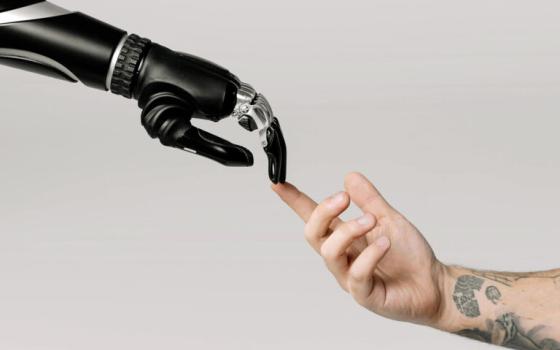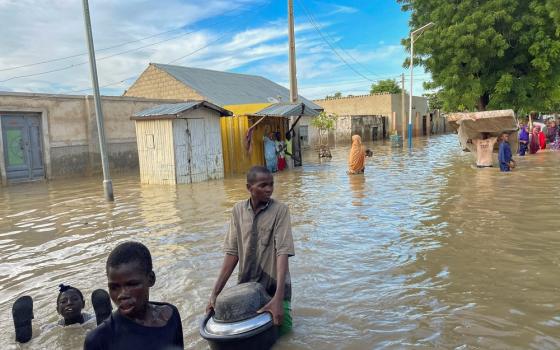If the capacity to disrupt ordinary traffic patterns is one sure sign of celebrity, then Pope Francis has already solidified his credentials as a star on the Roman scene.
I arrived today in Rome at roughly 11 a.m. local time and asked my driver at Fiumicino airport to take me directly to St. Peter's Square. He told me he'd get me as close as possible, but the area around St. Peter's itself was closed to traffic. When I asked why, he simply said: "It's the pope."
Today being Wednesday, Francis held his normal weekly general audience. Generally speaking, these audiences attract perhaps 10,000 people, and rarely does that kind of crowd in the vicinity of the Vatican cause a disruption to traffic flows. Today, however, Roman authorities estimated that Francis drew a crowd of at least 50,000, and perhaps as many as 80,000. Given that influx of humanity, the broad avenue of Via della Conciliazione was temporarily converted to a pedestrian zone three-quarters of the way down to the Castel Sant'Angelo, reflecting this pope's early reputation as a magnet for humanity.
In part, the usual Wednesday crowd was swelled due to tens of thousands of pilgrims from the Italian region of Triveneto, who were accompanying the seven bishops of their region on their ad limina visit. (Bishop Beniamino Pizziol of Vicenza told reporters Wednesday he's staying at the Casa Santa Marta, the Vatican hotel, during the ad limina visit, and was invited to dinner on Monday night with Francis.)
The crowd, however, also included a large cross-section of pilgrims from various parts of the world, including an unusually large turnout of tourists in Rome who simply wanted to see what all the fuss is about regarding the new pope.
The pope opened the audience with his now-familiar long swing through the crowd at the beginning. One pilgrim presented Francis with a new zucchetto, the white papal skullcap, which the pope immediately put on in place of his own.
In his remarks during the audience, Francis spoke on the Ascension of Jesus. He said it does not mean that Christ is absent to humanity, but rather that he's present "in a new way."
"We are never alone; the crucified and risen Lord guides us, and with us there are many brothers and sisters who in silence and obscurity, in their family life and work, in their problems and difficulties, their joys and hopes, live their faith every day and, together with us, bring to the world the lordship of God's love, in the risen Christ, ascended to heaven, an advocate for us," the pope said.
At the end of the audience, Francis also expressed his closeness "to the Iranian and Pakistani people" for the earthquake that brought "death and destruction" to the two countries.
That quake, estimated at magnitude 7.8, is believed to have caused at least 35 fatalities, though because it was located in a hard-to-reach area on the Iran/Pakistan border, experts say it may take time for the real toll to become clear.
At the conclusion of Wednesday's audience, Francis held a private meeting with Saleh Mohammad Al Ghamdi, the ambassador of Saudi Arabia in Italy. According to a brief Vatican statement released Wednesday morning, Al Ghamdi was carrying a message for the pope from Saudi King Abdullah bin Abdulaziz Al Saud.
Saudi Arabia is one of just a handful of states with which the Vatican does not currently enjoy diplomatic relations, and some observers believe that Wednesday's meeting may signal that the Saudis are open to moving in that direction. In that sense, today's meeting may be a sign that Francis' early popularity could generate new political and diplomatic capital for the Vatican.
If the Vatican and Saudi Arabia get serious about opening relations, the issue of religious freedom for the Christian minority in Saudi Arabia may prove to be a sticking point.
Looking just at Catholics, there are now believed to be 350,000 Catholics in Kuwait, 300,000 in Qatar, 150,000 in Bahrain, and 1.5 million in Saudi Arabia. They're composed mostly of so-called "guest workers" from the Philippines, Korea, India, Lebanon, Vietnam and Nigeria, employed in either the petroleum or domestic services industries. They face a wide range of difficulties, from abusive working conditions and a lack of legal protection to a fairly complete absence of religious freedom. Some Western embassies allow them to gather for prayer, as do the compounds operated by the oil companies.
On Monday, Pope Francis signaled he's aware of the growing threats faced by Christians in various parts of the world in remarks during his morning Mass celebrated at the Casa Santa Marta.
The "age of martyrs is not yet over," the pope said.
"Even today we can say, in truth, that the church has more martyrs now than during the first centuries. ... Some are killed because they teach the catechism; others are killed because they wear the cross ... Today, in many countries, they are maligned, they are persecuted ... they are our brothers and sisters who are suffering today, in this age of martyrs," he said.
(Follow John Allen on Twitter: @JohnLAllenJr)



